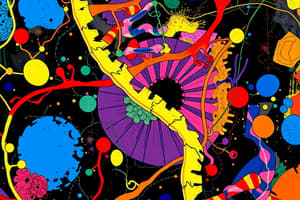Podcast
Questions and Answers
Which statement correctly describes the role of chloroplasts in plants?
Which statement correctly describes the role of chloroplasts in plants?
- Chloroplasts are involved in cell division.
- Chloroplasts are responsible for photosynthesis. (correct)
- Chloroplasts transport water and nutrients.
- Chloroplasts store genetic information.
What is the main difference between xylem and phloem in plants?
What is the main difference between xylem and phloem in plants?
- Xylem transports water, while phloem transports food. (correct)
- Xylem transports food, while phloem transports water.
- Xylem is found only in roots, while phloem is found only in leaves.
- Xylem is responsible for photosynthesis, while phloem is involved in respiration.
During which phase of the cell cycle do chromosomes align at the cell equator?
During which phase of the cell cycle do chromosomes align at the cell equator?
- Mitosis (correct)
- Cytokinesis
- Interphase
- G1 phase
Which system is primarily responsible for gas exchange in the body?
Which system is primarily responsible for gas exchange in the body?
What is a primary ethical concern associated with gene editing technology?
What is a primary ethical concern associated with gene editing technology?
Flashcards
Cell Specialization
Cell Specialization
Different cells perform specific tasks in an organism.
Mitosis
Mitosis
Cell division process copying DNA into two identical cells.
Photosynthesis
Photosynthesis
Process plants use to make food from sunlight.
Diffusion
Diffusion
Signup and view all the flashcards
Digestive System
Digestive System
Signup and view all the flashcards
Study Notes
Cell Theory & Structure
- Cell theory states that all living things are composed of cells, cells are the basic units of structure and function in living things, and new cells are produced from existing cells.
- Cells have various organelles with specific functions. Examples include the nucleus, which contains DNA, and the mitochondria, which produce energy.
Genes & DNA
- Genes are segments of DNA that carry the hereditary information for specific traits.
- DNA is a double helix structure that carries genetic information.
- DNA screening involves analyzing DNA to detect genetic disorders.
- Altering genes is a controversial area.
- Cloning also raises ethical concerns.
Mutations
- Mutations are changes in DNA sequence.
Cell Cycle
- The cell cycle includes interphase, mitosis, and cytokinesis.
- Interphase is the period of growth and development.
- Mitosis is nuclear division.
- Cytokinesis is the division of the cytoplasm.
- Checkpoints regulate the cell cycle.
Diffusion & Osmosis
- Diffusion is the movement of molecules from high to low concentration.
- Osmosis is the movement of water across a selectively permeable membrane.
Cancer
- Cancer involves uncontrolled cell division.
Cell Specialization & Differentiation
- Cells specialize to perform specific functions.
- Differentiation is the process where cells become specialized.
- Leaf structure is crucial for photosynthesis. Chloroplasts carry out photosynthesis.
Plant Structure & Function
- Xylem transports water and minerals.
- Phloem transports sugars.
- Plant organ systems include roots, stems, and leaves.
- Transpiration is the process of water loss from plants.
Cells & Tissues
- Cells combine to form tissues.
- Tissues combine to form organs
- Organs combine to form organ systems
- Stem cells are undifferentiated cells. Various technologies support diagnoses.
Digestive System
- Processes food mechanically and chemically. Structures include the mouth, stomach, intestines.
- Mechanical digestion involves physical breakdown.
- Chemical digestion involves chemical breakdown.
- Absorption occurs in the intestines.
Excretory System
- The excretory system removes waste products.
Circulatory System
- The circulatory system transports materials throughout the body. Structures include the heart, blood vessels, blood.
Respiratory System
- The respiratory system facilitates gas exchange. This includes the lungs, airways.
Interactions of Systems
- Different organ systems work together to maintain homeostasis.
Studying That Suits You
Use AI to generate personalized quizzes and flashcards to suit your learning preferences.




